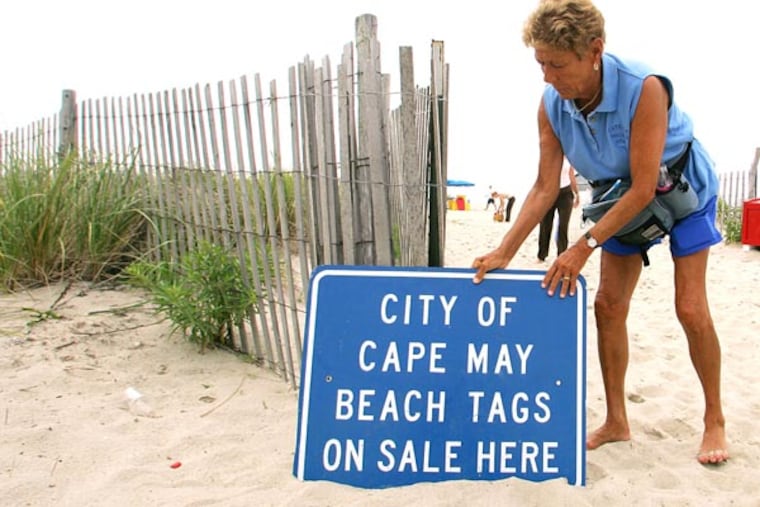Shore towns vow to fight bill to block beach fees
SEA ISLE CITY, N.J. - Drawing a line in the sand, Cape May County officials began a campaign Monday against a bid in the state Senate to bar Shore towns from charging for beach access if they take state or federal aid to restore beaches ravaged by Sandy.

SEA ISLE CITY, N.J. - Drawing a line in the sand, Cape May County officials began a campaign Monday against a bid in the state Senate to bar Shore towns from charging for beach access if they take state or federal aid to restore beaches ravaged by Sandy.
They said the measure would be more catastrophic than the storm itself.
"We'll do whatever we have to do to put a stop to this ridiculous idea," Freeholder Leonard Desiderio, who also is mayor of Sea Isle City, told a news conference in the gymnasium of the former Sea Isle elementary school called to show a "united front" against the bill and the first organized opposition to it.
Desiderio said the Cape May County group will also solicit opposition to the bill from officials in Atlantic, Ocean, and Monmouth Counties.
But Senate President Stephen Sweeney (D., Gloucester), the cosponsor of S-2368, introduced late last month with State Sen. Michael Doherty (R., Somerset), said he planned to dig in his heels.
"This is not a political question. . . . It's a philosophical one. It's about asking taxpayers to pay twice for something they already paid for," Sweeney said Monday. "It's simply not fair."
Beach-town officials collect hundreds of thousands - in some cases millions - of dollars a year from beach tags. The badges range in price from $5 a day to $50 for a season and must be worn by beachgoers, both visitors and residents, if they don't want to be tossed from the strands.
Virtually every beach town collects the fees, with the notable exceptions of Atlantic City, the Wildwoods, and Strathmere.
Officials call the badges a user fee and say the proceeds cover only the costs of operating the beaches - such as lifeguard salaries, trash removal, and rebuilding after storms.
Some town officials, including from Avalon and Cape May Point, said they don't collect enough and have to pass the additional costs on to local taxpayers by taking the money out of their general funds.
Desiderio and others said that if the bill became law, homeowners in Shore towns would have to pay hundreds, or even thousands, of dollars a year in higher property taxes.
A Cape May Point official said its beaches would have to be closed because the municipality could no longer afford a beach patrol.
More than two dozen local officials, from Ocean City down to Cape May Point - though not from the Wildwoods, which cover beach costs out of a 7 percent tourism tax - were present at the gathering.
"If this bill passes, we will probably have to close all our beaches to the public because we just won't have the money to pay for lifeguards anymore," said Cape May Point Deputy Mayor Anita van Heeswyk.
If beach fees aren't allowed, van Heeswyk said, Cape May Point's 600 households on average could have to come up with as much as 10 percent, or $600 more, a year in property taxes - an amount higher than the 2 percent cap on property tax increases set by the state.
Sweeney, a liberal Democrat from South Jersey, and Doherty, a conservative Republican from North Jersey, are an odd political pair.
"I'm shocked that I actually agree with him on a bill," Sweeney said. "But I agree with him on this bill, because it's taxpayers that have paid - and will pay - for that beach to be rebuilt."
Their bill would require municipalities that accept storm aid to provide beach access and oceanfront restrooms free.
Doherty proposed the bill last month - within three weeks of the storm - as residents, business owners, and municipalities were digging out from layers of sand and muck that covered streets and the bottom floors of buildings. He said the tag system unfairly limits access to a "public resource that's been a beneficiary of a great deal of federal investment."
Shore officials called the timing "insensitive" and "in poor taste," but Doherty and Sweeney have contended that since it is likely that hundreds of millions of public dollars will be spent repairing the Shore, the time is now to discuss the issue.